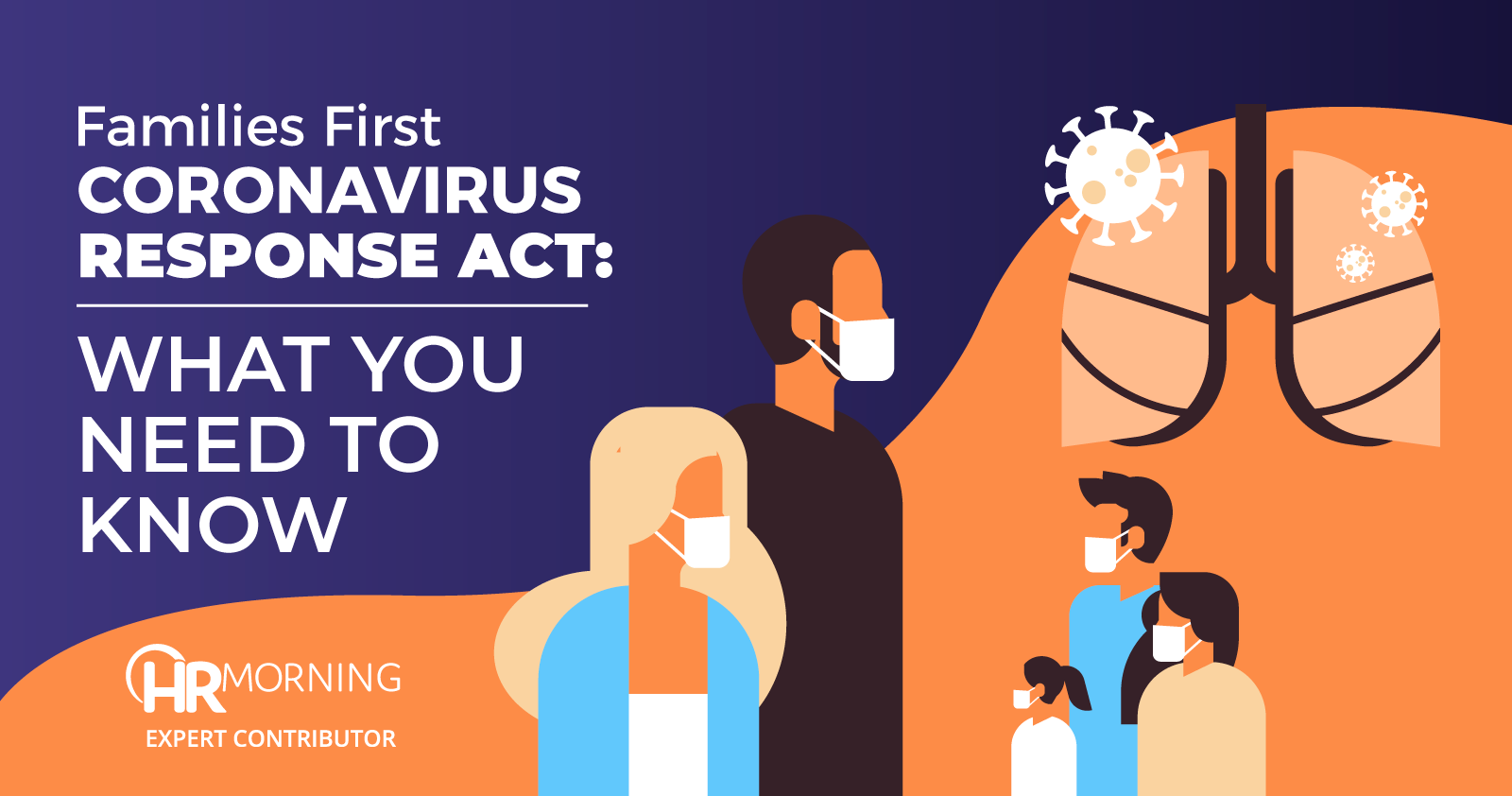In an effort to provide employees paid family and medical leave and paid sick leave in response to the COVID-19 pandemic, Congress recently passed The Families First Coronavirus Response Act (the Act). The Act will take effect on or by April 2, 2020.
The new law creates two new emergency leave benefits for eligible employees: (1) emergency paid family and medical leave, and (2) emergency paid sick leave. It generally applies to employers with fewer than 500 employees, with some exceptions discussed below. Covered employers are required to post the new Families First Coronavirus Response Act labor law poster.
Key provisions of the Act that will impact employers are summarized here:
Up to 12 weeks of Emergency Family Medical Leave (EFML) is available to employees who have been employed a minimum of 30 days and who are unable to work (or telework) because they need to care for their child whose school is closed, or whose childcare provider is unavailable because of a public health emergency. Additionally, the Act provides that:
- The first 10 days of EFML is unpaid, but employees may elect to substitute any of the employer’s other paid leave benefits during this period, e.g., paid vacation leave.
- After the initial unpaid 10 day period, employers must pay employees at least two-thirds of their regular compensation, up to a maximum of $200 per day or $10,000 in the aggregate.
- The FMLA’s job protections apply to EFML, but there is an exemption for employers with fewer than 25 employees, where the employee’s position is eliminated because of economic slowdowns related to the declaration of a public health emergency and the employer attempts to restore the employee’s employment within a year.
- The Secretary of Labor is permitted to exempt employers with fewer than 50 employees from the EFML requirements if the Act’s requirements would “jeopardize the viability of the business as a going concern.” We are closely monitoring the Department of Labor for announcements about possible exemptions for small employers.
Emergency Paid Sick Leave (EPSL) is available to all employees for immediate use, regardless of their length of employment. Employees may take EPSL for the following reasons:
- The employee is subject to a federal, state, or local quarantine or isolation order due to COVID-19.
- The employee has been advised by a healthcare provider to self-quarantine because of concerns related to COVID-19.
- The employee is experiencing symptoms of COVID-19 and seeking a medical diagnosis.
- The employee is caring for an individual who is quarantined or advised by a healthcare provider to self-quarantine.
- The employee is caring for a son or daughter if the school or place of care for the child has been closed, or the child care provider is unavailable because of COVID-19 precautions.
- The employee is experiencing any other, substantially similar condition, as specified by the Secretary of Health and Human Services in consultation with the Secretary of the Treasury and the Secretary of Labor.
Other aspects of EPSL include:
- Full-time employees are entitled to 80 hours of EPSL, and part-time employees are entitled to EPSL in the amount equal to the average amount of hours they work over a two-week period.
- There is no carryover of EPSL into the following calendar year, and employers are not required to pay out unused leave upon an employee’s separation from employment.
- Employers must pay EPSL to employees in addition to any other leave benefits the employer offers, and employers may not require employees to use any other leave before using EPSL.
- If an employee uses EPSL to care for himself or herself for reasons (i)-(iii) listed above, employers must pay the employee his or her regular compensation, up to a maximum of $511 per day or $5,110 in the aggregate.
- If an employee uses EPSL to care for a family member or for reasons listed above, employers must pay the employee either two-thirds of his or her regular compensation or the minimum wage, whichever amount is greater. Employers must only pay up to a maximum of $200 per day or $2,000 in the aggregate.
- Employers must post a notice about leave entitlements in a conspicuous location within the job site; the Department of Labor is expected to publish a model notice for posting on or before March 25, 2020.
- The Secretary of Labor is permitted to exempt employers with fewer than 50 employees from the EPSL requirements if the Act’s requirements would “jeopardize the viability of the business as a going concern.” We are closely monitoring the Department of Labor for announcements about possible exemptions for small employers.
The Act provides employers some financial relief in the form of tax credits on a dollar-for-dollar basis for EFML or EPSL payments to employees, subject to certain caps.
In addition to the Act, many state and local jurisdictions are considering legislation that may supplement the Act’s leave benefits in response to COVID-19. Employers should confer with counsel about how state and local laws may augment the leave to which their employees are entitled.
For some answers to commonly asked questions regarding how to communicate with staff about COVID-19 challenges, click here.
Complying with the new Families First Coronavirus Response Act (FFCRA) is challenging because so much of the new law is long on legal mandates and what employers must do, but short on the details of how to do it. Employers are left confused and not sure where to start.
Click this invitation to a link to a 75-minute workshop that provides up-to-date guidance on how to interpret what the Paid Sick Leave and expanded Family Medical Leave provisions of the FFCRA actually mean; and what employers need to do now to comply with the new mandates.


